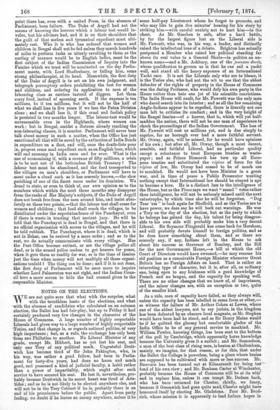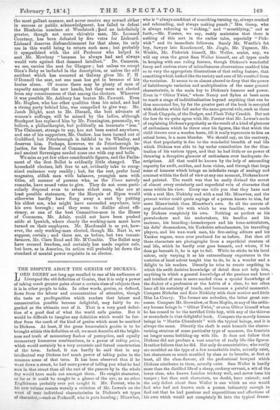NOTES ON THE ELECTIONS.
WE are not quite sure that what with the surprise, what with the breathless haste of the elections, and what -with the absence of candidates who calculated on an autumn election, the Ballot has had fair-play, but up to Friday it had certainly produced very few changes in the character of the House of Commons. A large number of highly respectable Liberals had given way to a large number of highly respectable Tories, and that change is, as regards national politics, of very high importance ; but, as a rule, the exchange has only been from one Philistine to another. No Liberal Minister of any -grade, except Mr. Hibbert, has as yet lost his seat, and -only one Tory of any political mark. Ungrateful, Droit- wich has become tired of Sir John Pakington, who, in his way, was rather a good fellow, had been in Parlia- ment for forty-five years, had done no harm and much good, and possessed a kind of judicial faculty, a habit rather than a power of impartiality, which ought after such service to have secured his seat. He lost it, nevertheless, pro- bably because Droitwich in its secret heart was tired of Aris- tides; and as he is not likely to be elected anywhere else, and will not be in the Tory Cabinet if he is, probably there is an end of his prominence before the public. Apart from party feeling, we doubt if he leaves an enemy anywhere, unless it be some half-pay Lieutenant whom he forgot to promote, and who may like to gain five minutes' hearing for his story by striking him—with careful anxiety not to hurt him—in the chest. As Mr. Goschen is safe, after a hard battle, by far the largest figure lost on the Liberal side is Mr. Fawcett, who was, in his way, a leader, and distinctly raised the intellectual tone of a debate. Brighton has actually postponed a Member who raised her political standing far above its real value to a General Shute—in politics an un- known name—and a Mr. Ashbury, one of the jeunesse dore'e, whose qualification to govern us is that he can sail a yacht well, and stand all the heavy expenses of an International Yacht race. It is not the Liberals only who are to blame, it is the Tories also, who had not the wit to see that the ablest defender of the rights of property in the House of Commons was the daring Professor, who would defy his own party in the House rather than bate one jot of his scientific convictions.
The India House will exult, for Mr. Fawcett was the only man who dared search into its interior ; and as all the few remaining Anglo-Indians appear to be expelled, there is literally not one man left to criticise its conduct ; and in the very height of the Bengal famine—of a horror, that is, which will yet half- madden the nation, there will not be one man of experience to check the proceedings of the Indian Government. The loss of Mr. Fawcett will cost us millions yet, and is due simply to caprice, for no borough ever had a more faithful servant. Mr. Otway, again, will be missed, for he would have opinions of his own ; but after all, Mr. Otway, though a most decent, sensible, and faithful Liberal, had no particular quality except a reluctance to treat European treaties as waste- paper ; and as Prince Bismarck has torn up all Euro- pean treaties and substituted the re'gime of force for the re'ginte of law, Mr. Otway had ceased to be of much use to mankind. He would not have been Minister in a great war, and in time of peace a Public Prosecutor wanting nothing except that International law should be obeyed is apt to become a bore. He is a distinct loss to the intelligence of the House, but as the Times says we want " sound " votes rather than intelligence, he will not be seriously missed until the next catastrophe, by which time also he will be forgotten. "Dog Tear 'em" is back again for Sheffield, and as the Tories are to have power, we dare say he will bark out warnings. He was a Tory on the day of the election, but as the party to which he belongs has gained the day, his talent for being disagree- able to his own side will probably make him a very decent Liberal. Sir Seymour Fitzgerald has come back for Horsham, and will probably devote himself to foreign politics, and as he does know something about them, and as there are scarcely any, if any, Indians left in the House to ask about his success as Governor of Bombay, and the Bill for the new Government House,—a bill at which the old Court of Directors would have swooned,—he may resume his old position as a conceivable Foreign Minister whenever Great Britain has no Foreign Affairs on hand. That is rather an interesting type of character, but it is, after all, an ordinary one, being open to any Irishman with a good knowledge of French and no brogue, and the capacity for speaking well.
There are no other changes that we know of, of importance, and the minor changes are, with an exception or two, quite of the smaller kind.
As a rule, men of capacity have failed, as they always will, unless the capacity has been labelled in some form or other,— as witness the failure of Mr. Arthur Cohen at Lewes, where one of the ablest lawyers, not to say jurists, in the kingdom has been defeated by an obscure local magnate, as Mr. Stephen would have been had he stood, and as Sir Henry Maine would be if he quitted the gloomy but comfortable glades of the India Office to be of any general service to mankind. Mr.
William Fowler, knowing things, has been sent to the bottom of the poll by Cambridge, which apparently hates knowledge because the University gives it a surfeit ; and Mr. Samuelson, a man of the best class of rising men, is beaten at Cheltenham, mainly, we imagine, for that reason, or for this, that under the Ballot the College is powerless, being a place where brains are supposed to be cultivated with more or less success. Mr. Bouverie has been turned out at Kilmarnock for being fond of his own view ; and Mr. Bonham Carter at Winchester, probably because the House of Commons will be at its wits' and to replace him, unless it can tempt Mr. Dodson back, who has been returned for Chester, chiefly, we fancy, because if Greenwich had gone quite mad, Chester might have honoured itself by electing Mr. Gladstone. Poor Mr. Brod- rick, whose mission it is apparently to lead forlorn hopes in the most gallant manner, and never -receive any reward either in success or public acknowledgment, has failed to defeat the Blenheim nominee at Woodstock ; land an indefinitely greater, though not more chivalric man, Mr. Leonard Courtney, has been defeated by five votes for Liskeard. Liskeard deserves disfranchisement for that alone, its only use in this world being to return such men ; but probably it sympathised with the old Professor who helped to seat Mr. Mowbray "because he always had and always would vote against that damned intellect." Dr. Cameron, we see, carries the Beat for Glasgow ; but unless we accept Ginx's Baby as included in the description, or unless the odd accident which has occurred at Galway gives Mr. F. H. O'Donnell the seat, not one man has got in because of his brains alone. Of course there may be plenty of men of capacity amongst the new hands, but they were not elected from any consciousness of that among the electors. Wherever it was possible Mr. Ashbury has beaten Mr. Fawcett. Even Mr. Hughes, who has other qualities than his mind, and had a strong party behind him, was compelled to give way. Mr. Jacob Bright, next to Mr. Disraeli, the best advocate of women's suffrage, will be missed by the ladies, although Stockport has replaced him by Mr. Pennington, personally, we believe, a philanthropist, but politically an incarnate "ism." The Claimant, strange to say, has not been seated anywhere, and one of his supporters, Mr. Onslow, has been turned out of Guildford, but Peterborough is faithful to its Whalley, and deserves him. Perhaps, however, we do Peterborough in- justice, for the House of Commons is an ancient Sovereign, and ancient Sovereigns needed some one with cap and bells.
We miss as yet few other considerable figures, and the Parlia- ment of the first Ballot is evidently little changed. The household electors, left free to act, evidently take to recog- nised eminence very readily ; but, for the rest, prefer local magnates, oldish men with balances, youngish men with titles, all, manner of persons who, as the Times naively remarks, have sound votes to give. They do not seem parti- cularly disposed even to return eldest sons, who are at least possible statesmen, for the Marquis of Ripon would otherwise hardly have flung away a seat by putting his eldest son, who might have succeeded anywhere, into his own borough ; and they seem to dislike silent effi- ciency, or one of the best Committee-men in the House of Commons, Mr. Adair, could not have been pushed aside at Ipswich, where clearly the working-men must have turned on their employers. Mr. Macdonald is as yet, how- ever, the only working-man elected, though Mr. Burt is, we suppose, certain ; and there are, as before, but two tenant- farmers, Mr. Clare Read and Mr. M'Combie. The Ballot may have secured freedom, and certainly has made caprice safe, but here, as in America, its action will probably let down the standard of mental power requisite in an elector.



































 Previous page
Previous page